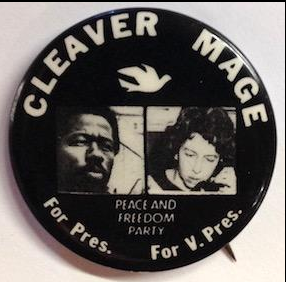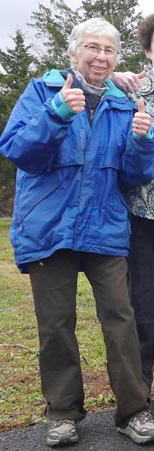John Vliet Lindsay, November 24, 1921 (New York, NY) – December 19, 2000 (Hilton Head Island, SC)
VP candidate for New Party (1968)
VP candidate for Californians for an Alternative (1968)
VP candidate for Independent (1968)
VP candidate for Liberal Principle Party (1968)
VP candidate for Americans for a New America (1968)
Running mate with nominee: Eugene McCarthy (1916-2005)
Popular vote: 25,057 (0.04%)
Electoral vote: 0/538
The campaign:
In 1968 an obscure political figure, US Sen. Eugene McCarthy (Minn.), challenged incumbent President Johnson in the Democratic primaries. McCarthy's anti-war stance energized a whole new generation of young activists who were really in the first wave of voters to have grown up entirely in the shadow of the atomic/nuclear mushroom cloud and thus felt a visceral sense of urgency the older generations for the most part failed to grasp.
McCarthy became a David to Johnson's Goliath, and within a short time LBJ decided to drop out of the race, opening it up for Sen. Robert Kennedy and Vice-President Hubert Humphrey. McCarthy soon found himself outspent and outflanked by the better known candidates and was marginalized to the far Left by the Democratic Party establishment. After the Party convention McCarthy waited until the very last week of the campaign to finally give a lukewarm endorsement to Humphrey.
In the meantime, McCarthy's followers were not so easily defeated. The 1968 Democratic convention in Chicago was a bloody affair and Humphrey was seen as being too closely tied to the unpopular LBJ. McCarthy's followers were prepared to go all the way to November, attempting to get his name on the ballot in several states as a "fourth party" since George Wallace already had the primo "third party" position.
By early September 1968 it was too late for McCarthy's followers to place him on the ballot in many states, so energetic write-in campaigns were waged. In Georgia, Oregon, and Rhode Island groups sprang up to work for McCarthy. In Michigan there was the McCarthy Write-In Committee, Massachusetts had three groups pushing for the Senator-- Citizens for Participation Politics, Conference for New Political Action, and the Flag Party-- and in New York there was the Coalition for Independent Candidacy (aka Coalition Party). As far as I could ascertain, none of the above proposals included a running mate.
McCarthy had various running mates and different party banners in other states. The most coordinated effort, such as it was, concerned the New Party, formed chiefly by Marcus Raskin, co-director of the Institute for Policy Studies. "If we cannot force a realignment of political structures," said Raskin, "There will be mass violence."
Raskin's document
Why the New Party? included:
Across the nation there is a general revulsion for the political parties which in reality have built their power on the interests of special groups that have no base among the people, which maintain power through war and cold war, privilege selling and the granting of favors to the few.
Young people, workers on the line in the factory and in the offices, women, farmers, black and brown people have come to believe that the two political parties are far too deeply implicated in causing the basic problems of American society to do anything toward resolving them.
The Democratic and Republican parties have allowed the cities to decay, encouraged and sustained a huge military establishment, supported a reckless and morally indefensible colonial war in Vietnam, and diverted the economy for wasteful and dangerous activity.
Although the Party was born in the Left, Raskin voiced a belief his anti-Establishment message could resonate with George Wallace voters as well.
The New Party thought about nominating McCarthy, as well as considering Sen. George McGovern, actor Paul Newman, NYC Mayor John Lindsay, Dr. Benjamin Spock, and Justice William O. Douglas. But in the end they decided to allow each state to nominate whatever ticket they wanted. It is difficult to say if the New Party operated under variant names across the country.
McCarthy himself disavowed this fourth party activity and took steps to keep his name off the November ballot. Raskin didn't care. He said McCarthy was going to be nominated whether he liked or not. They wanted his name and star power.
The most popular McCarthy ticket was that where New York Mayor John Lindsay was his running mate. The New Party was actually successful in placing the McCarthy/Lindsay team on the Arizona ballot (although it seems the VP nominee names were not included?!), the only state where the Senator's name was printed as an option. In Vermont and New Hampshire, McCarthy and Lindsay managed to have their names removed, but the electors remained as a choice with a blank slate. The New Party in Texas had an active write-in campaign for McCarthy/Lindsay.
After McCarthy and Lindsay removed themselves as New Politics Party options in Indiana, they were replaced on the ballot by Dick Gregory and Mark Lane.
In California the McCarthy/Lindsay write-in effort was staged by a group called Californians for an Alternative, in Minnesota by the Liberal Principle Party, in Wisconsin by Americans for a New America. Connecticut also had some McCarthy/Lindsay activity.
Mayor Lindsay didn't really have a lot of time to deal with the involuntary VP draft. In hindsight Lindsay called the last few months of 1968 "the worst of my public life" as he dealt with multiple public employee strikes, the threat of race riots, and assassination threats. Even though he was liberal outsider in the Republican Party Lindsay was under consideration as a potential Vice-Presidential candidate with Nixon and gained a smattering of delegate votes for both positions at the 1968 convention. In 1971 Lindsay switched to the Democratic Party.
In terms of popular votes, California was the dominant treasure trove for the ticket. But in terms of state percentages they fared best in Arizona, the only state where McCarthy appeared on the ballot. Although Vermont and New Hampshire write-in electors were left without a candidate, I am including them in the final count as well since the original intention was McCarthy/Lindsay: Arizona 2751 (0.56%), Vermont 579 (0.36%), California 20721 (0.29%), New Hampshire 421 (0.14%), Minnesota 585 (00.4%). Figures for Connecticut, Texas and Wisconsin, probably in the hundreds, are not easily obtainable.
McCarthy's official popular vote total including all of his various running mates came to 25,634 (00.4%). I track 25,057 (0.03%) of those votes to the McCarthy/Lindsay ticket although it is a safe bet the number of uncertified write-ins nationwide probably places the result at a much higher number.
Years later McCarthy and Lindsay shared a program at the Denver Forum. I wonder if their 1968 ticket came up in discussion?
Election history:
1959-1965 - US House of Representatives (NY) (Republican)
1966-1973 - Mayor of New York, NY (Republican/Democratic/Liberal/Independent Citizens/Independent)
1968 - Republican nomination for US President -
defeated
1968 - Republican nomination for US Vice-President -
defeated
1972 - Democratic nomination for US President -
defeated
1980 - US Senate (NY) (Democratic) - primary -
defeated
Other occupations: sailor (US Navy WWII), bank clerk, attorney, actor, novelist, TV morning show guest host
Buried: Memorial Cemetery of Saint John's Church (Laurel Hollow, NY)
Notes:
Buried in the same cemetery as George Bruce Cortelyou, William S. Paley, and Henry Louis Stimson.
Some of his opponents in the 1965 Mayorial race included Abraham Beame, William F. Buckley,
Clifton DeBerry and Eric Hass.
Winner of the 1980 primary was Elizabeth Holtzman.
In the
Batman TV series of the era, Gotham City's chief municipal officer was Mayor Lindseed.

















